When asked to name waterfowls, you easily think about swans, ducks, and geese. There’s no need to be technical as you can tell them apart by their looks and traits. But have you ever wondered about the meaning behind goose and geese?
What is the difference between a goose and geese? These terms refer to a certain aquatic animal that’s been living on earth for 10 to 12 million years. It looks like a large duck with a long neck. A goose is a singular form, and it becomes geese if it’s more than one. The plural form follows the pattern of –iz suffixes like ‘tooth-teeth’ and ‘mouse-mice.’
There are two types of geese. The body of the common species is entirely white. On the other hand, the second type of geese has a black neck, white chinstrap markings, and underside. It’s called a Canadian goose.
You know now that goose and geese are the singular and plural forms of one of the aquatic animals. After this clarification, you can feed your curiosity about this animal by reading this article.
What Are Geese? Are They Birds?
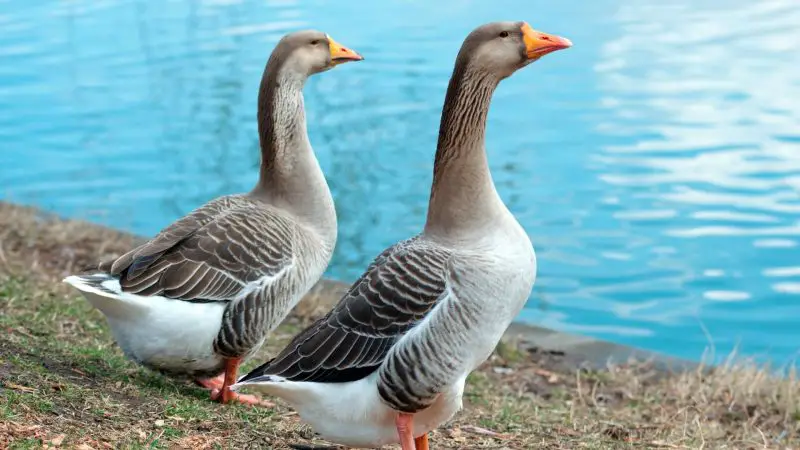
Geese, just like swans and ducks, belong to the Anatidae family. They’re herbivore birds that are known for their loud and aggressive behavior. These creatures live close to freshwater rivers, streams, ponds, and lakes.
Their nests are made of twigs, grass, leaves, lichen, and mosses, and they’re placed either on the ground or in an elevated area. The appearance of geese is akin to a swan, but they have a smaller body and with an orange or black bill.
What Is Baby Geese Called?
A baby goose is a gosling, whereas baby geese are goslings.
Are Goose and Duck the Same?
Goose and duck are not the same. Although they belong to the same family and have the same habitat, they differ in size, shape, behavior, and color. Here are their differences:
| Goose | Duck |
| Medium to large aquatic animals, larger than ducks | Medium-sized aquatic animals, smaller than geese |
| Doesn’t have bright plumage | Has bright plumage |
| Has longer legs and neck, and elongated body | Has a stout body and short legs |
| Consumes short grasses | Eats seeds, insects, and snails |
| Geese can be white, gray, and black with some spots | Ducks can have green, black, yellow, and orange colors |
| Makes honking noise | Quacks |
Can Duck and Goose Mate?
Duck and goose can mate since they have similar sex organs. However, the result is an unfertilized egg because they have different chromosomes.
Why Are Geese So Aggressive?
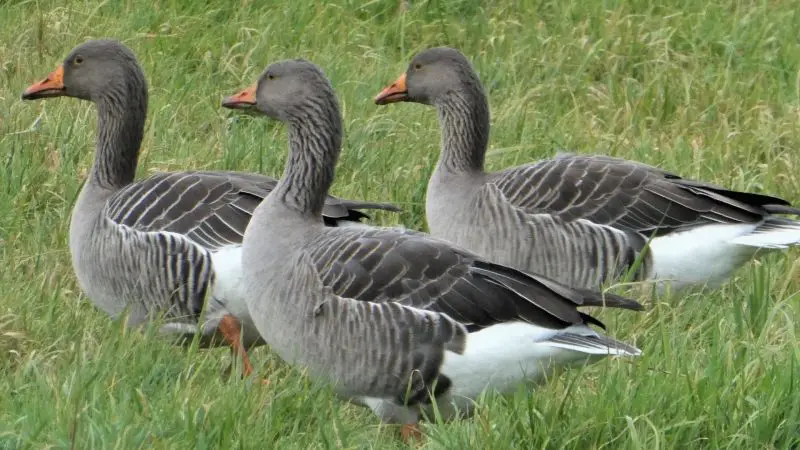
Geese are so aggressive when they’re mating and nesting as a defense mechanism. They prefer to have a calm and uninterrupted nesting period.
Thus, they don’t hesitate to show their rage and become aggressive when there’s disturbance and intrusion. In connection with their behavior, they don’t like their homes to be invaded.
Why Do Geese Have Teeth on Their Tongues?
Geese don’t exactly have teeth on their tongues. Instead, they have cartilage on their tongues that are called ‘tomia.’ Nonetheless, this cartilage is more like teeth when it comes to form and functions.
What to Do if a Goose Chases You?
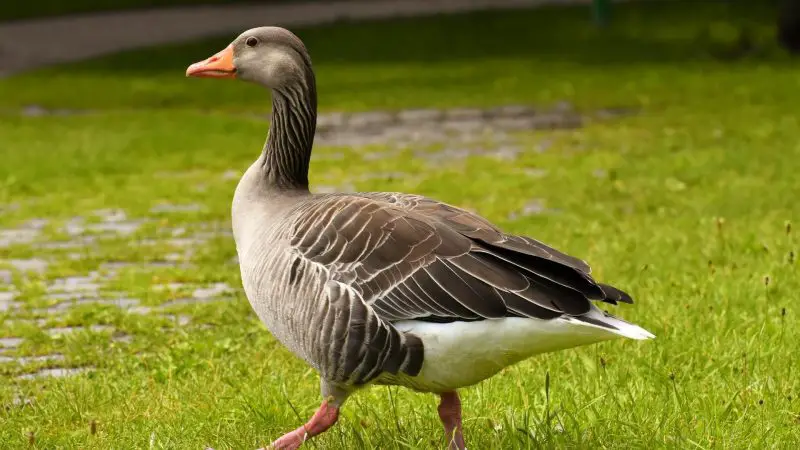
Coming across a goose or geese in the grass area, park, parking lot, and other similar places can happen. It may be a usual occurrence for some. But if not, some people will be taken aback, especially when the geese make loud noises.
The last thing that a person can do when seeing geese is to panic. Doing so will make them feel threatened. By following these ways, you can avoid causing anxiety among geese and stop them from chasing you.
- Maintaining eye contact. Don’t scream when you see geese. Stop and look them straight in the eyes. You can take deep breaths if you ever feel uneasy.
- Move slowly. Once you maintain eye contact, you have to move slowly without making any noises or sudden movements. Walk back by doing side steps while you don’t take your eyes off the animals. Sidestepping is the right move as geese will follow if you choose to directly move away.
- Staying calm. It’s crucial to stay calm as an assurance to the geese that you’re not invading their homes. Continue to slowly sidestep backward.
- Don’t turn or run away. You don’t have to put up a fight with the geese. Never turn away and run as it means danger to them.
What to Do When the Geese Chase or Attack You?
The geese may still sense danger even though you follow the previous steps. When they fly towards you, move your body to a 90-degree angle but remain facing them. Move slowly from the area as they will stop following you.
Can a Goose Be a Pet?
Goose can be a pet provided that you’ve chosen the ideal breed. As per the recommendation of Dr. Hoppes, a clinical professor from the College of Veterinary Medicine in Texas A&M, Toulouse goose makes a good pet.
Can Geese Smell Fear?
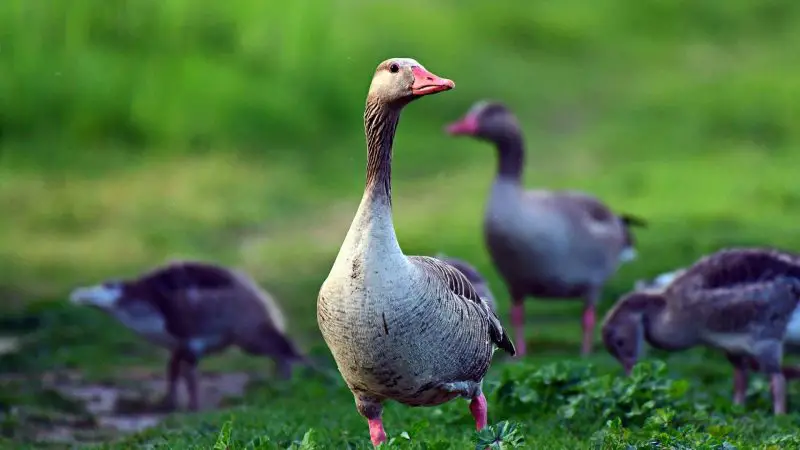
Geese can smell fear, and once they sense it, they have the impulse to protect themselves. When it happens, they think of you as an invader.
Are Geese Smart?
Geese are smart because they have a good memory. They can’t easily forget situations, people, and other humans. This ability makes them good watchers of intruders and possible danger.
Why Do Geese Vibrate Their Necks?
There are many reasons why geese vibrate their necks. It’s their way of communication with each other. When doing it, they emit loud cries and honks. It’s also an act of defiance when they feel threatened. After defeating a foe, their necks also vibrate to release a cry of victory.
Why Do Geese Honk So Much?
- When geese mate from the middle of the winter until early spring, the male ones honk when fighting over a female. The noise that they make is particularly louder than in other situations. Even so, the females choose the male she wants to mate with.
- Honking is their way to answer and welcome their mate. The latter is done when they haven’t seen their mates for a long time. It’s also a greeting to each other after they played and searched for food.
- When geese migrate, they create a ‘V’ formation while flying. Those that are placed behind the formation honk to encourage the ones ahead of them to increase the speed. It’s done so the gaggle can reach their destination on time.
- Before they take a flight and take part in ‘V’ alignment, they honk.
- A lost goose honks so much to find its way back to its flock. It seeks help from others as they always work as a team.
- Geese ward off intruders and predators by honking. When an animal or even humans get near their territories, they honk to assert their territorial and protective instincts. They’re fully aware that they need to secure their nest and offspring.
Why Do Geese Scream When They Fly?
They scream when they fly to keep the flock together, as they maintain the ‘V’ formation.
Do Geese Make Noise When Mating?
Geese don’t make noise when mating. They do it when welcoming their mates. Instead, the neck-dipping behavior is noticeable before they begin mating.
How Can You Tell if a Goose Is a Male or Female?
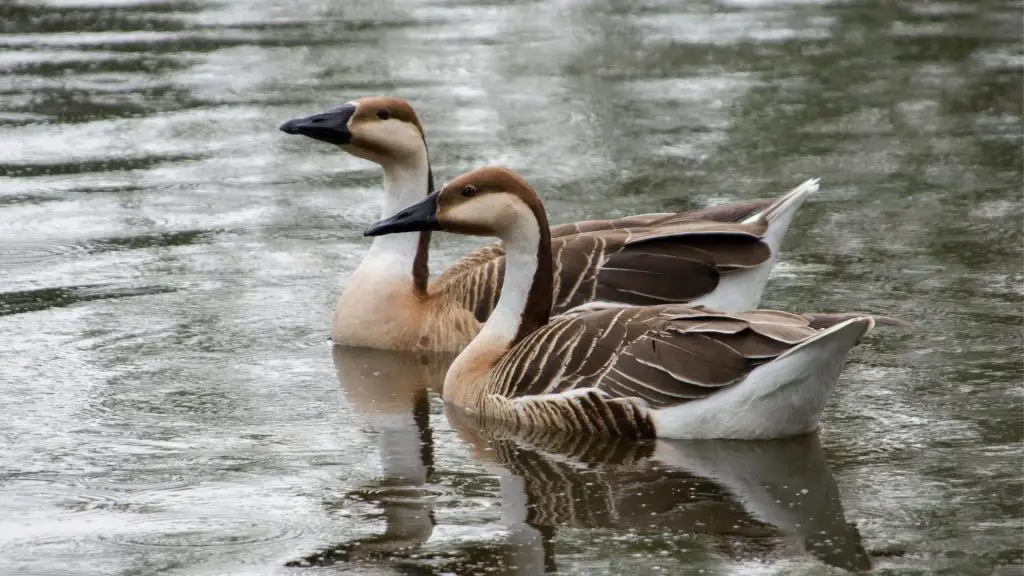
The gander or the male goose is larger than the female. His head and neck are usually bigger. By listening to the noises that they make, the male voice is higher while the female voice is harsher. Males of some goose breeds have a lighter color than females.
Do Male Geese Stay With Their Mate?
Male geese stay with their mate, and it’s rare for them to leave their family. When his mate passes away, he mourns and leaves the flock. Some look for a new mate or become solitary. There’s even news that a goose doesn’t want to leave the place where its mate died.
Why Do Geese Throw Their Heads Back?
You’ll see geese throwing their heads back when they take a mouthful of water. They tip their heads to swallow.
Summary
This article has not only given you this answer but shown you how to better understand the geese’s behaviors. They can be loud and aggressive, but it’s all because of their protective and survival instincts. You can avoid conflict with them if you don’t disturb or provoke them.
